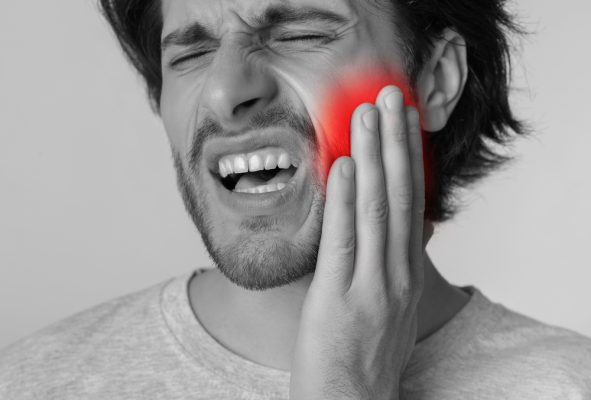Fix Your Smile After Accidents or Dental Trauma
Table of Contents
Dental emergencies involving tooth fractures and cracks can be both painful and alarming. Whether it’s a minor chip or a severe fracture extending into the root, these dental issues require immediate attention and proper treatment to prevent further damage and preserve your dental health.
Our Seattle emergency dentist is here to help you address cracked or fractured teeth for instant relief.

Types of Tooth Fractures and Cracks
Craze Lines
Craze lines are superficial cracks that affect the outer enamel of the tooth. They’re typically harmless and don’t require immediate treatment. However, if they cause aesthetic concerns, dental bonding can be used to improve their appearance.
Fractured Cusp
A fractured cusp occurs when a part of the tooth’s chewing surface breaks off. This type of fracture usually doesn’t cause pain, but it may lead to discomfort during chewing. Our Seattle emergency dentist can restore the tooth by placing a dental crown over it.
Cracked Tooth
A cracked tooth involves a more significant fracture that extends from the chewing surface toward the root. Cracked teeth can be painful, especially when chewing, and may cause sensitivity to temperature changes. Depending on the severity, a dental crown, root canal treatment, or extraction may be necessary.
Split Tooth
A split tooth occurs when a tooth is vertically divided into separate segments. This type of fracture usually extends from the chewing surface to the root and can be painful. Saving a split tooth may not be possible, and extraction may be the only solution.
Vertical Root Fracture
A vertical root fracture starts in the tooth’s root and extends upward. This fracture isn’t visible to the naked eye and may cause intermittent pain when biting. Unfortunately, vertical root fractures often result in tooth extraction.

Causes of Tooth Fractures and Cracks
Understanding the causes of tooth fractures and cracks can help you take preventive measures to protect your teeth. Common factors that can lead to tooth fractures include:
- Dental Trauma: Accidents, falls, or blows to the face can cause tooth fractures, especially in the front teeth.
- Biting on Hard Objects: Using teeth to open bottles, crack nuts, or chew on objects can lead to dental damage.
- Tooth Decay: Untreated tooth decay weakens the tooth structure, making it more susceptible to fractures.
- Bruxism (Teeth Grinding): Grinding or clenching your teeth, especially during sleep, can exert excessive pressure on the teeth.
- Uneven Bite: An uneven bite can cause certain teeth to bear more force, increasing the risk of fractures.
- Age and Wear: As we age, our teeth naturally weaken and become more prone to fractures and cracks
Emergency Treatments for Tooth Fractures and Cracks
Dental Bonding
Dental bonding is a non-invasive and cost-effective treatment option for minor tooth fractures, including craze lines and small chips. During the procedure, your dentist will apply a tooth-colored composite resin to the damaged area, carefully shaping and bonding it to the tooth. Dental bonding restores the tooth’s appearance and reinforces its structure, providing strength and protection.
Dental Crown
A dental crown, also known as a cap, is a popular option for restoring a severely fractured tooth. If a substantial portion of the tooth is damaged, or if the crack extends into the root, a dental crown is often recommended. The procedure involves placing a custom-made crown over the entire visible portion of the tooth, effectively restoring its shape, function, and appearance. Dental crowns are durable and long-lasting, making them an excellent solution for extensive tooth fractures.
Root Canal Treatment
When a tooth fracture reaches the inner pulp of the tooth, it can cause excruciating pain and sensitivity. In such cases, a root canal treatment may be necessary to save the tooth from extraction. During a root canal procedure, the infected or damaged pulp is removed, and the root canal system is thoroughly cleaned and sealed. Once root canal treatment is complete, a dental crown is often placed to protect and strengthen the treated tooth.
Tooth Extraction
In some situations, tooth fractures are so severe that the affected tooth can’t be saved. Tooth extraction becomes the last resort when the damage is extensive, the tooth can’t be effectively restored, or it poses a risk of infection to surrounding teeth. After the extraction, your dentist will discuss tooth replacement options, such as dental implants, bridges, or dentures, to restore your smile and maintain oral function.
Preventive Measures to Avoid Tooth Fractures and Cracks
Prevention is key to maintaining healthy teeth and avoiding dental emergencies like fractures and cracks. Here are some preventive measures you can take:
- Wear a Mouthguard: If you participate in sports or activities with a risk of dental trauma, wearing a mouthguard can protect your teeth.
- Avoid Chewing on Hard Objects: Train yourself to refrain from using your teeth to open bottles or chew on hard items like ice or pens.
- Maintain Good Oral Hygiene: Regular brushing, flossing, and dental check-ups can prevent tooth decay and strengthen teeth.
- Address Bruxism: If you grind or clench your teeth, talk to your dentist about using a mouthguard or other solutions to protect your teeth.
- Correct Uneven Bite: If you have an uneven bite, consult your dentist or orthodontist to address the issue and prevent dental damage.
- Limit Acidic and Sugary Foods: Reducing the consumption of acidic and sugary foods can help prevent enamel erosion and tooth decay.

Frequently Asked Questions
Visiting the emergency room for a cracked tooth is generally not necessary unless you’re experiencing severe pain, excessive bleeding, or other serious symptoms along with the tooth fracture. In most cases, it’s best to schedule an appointment with your dentist as soon as possible for appropriate evaluation and treatment.
Not all fractured teeth need to be pulled. The course of treatment depends on the severity of the fracture and the extent of damage to the tooth. In some cases, dental bonding, crowns, or root canal therapy can effectively repair the fractured tooth and save it. However, if the tooth is extensively damaged and cannot be restored, extraction may be the only viable option.
Fixing a broken tooth is relatively urgent, especially if the fracture has exposed the inner layers of the tooth, leading to sensitivity and pain. Immediate treatment can prevent further damage, and infection, and alleviate discomfort. Ignoring a broken tooth may worsen the condition and may eventually lead to the loss of the tooth.
Schedule an appointment with your dentist within a day or two of experiencing the break. If immediate care isn’t possible, taking proper precautions, such as avoiding hard foods and maintaining good oral hygiene, can help prevent further damage until you can see a dentist.
Repair Your Broken Smile With Dr. Johnson
When it comes to emergency tooth fractures and cracks, time is of the essence. Seeking prompt dental care and understanding the available treatment options are critical for preserving your dental health and relieving pain.
Remember, if you encounter a tooth fracture or crack, don’t hesitate to contact Dr. Johnson or visit an emergency dental clinic for immediate attention. Contact our Seattle dental office at (206) 682-3888 to schedule an appointment.
